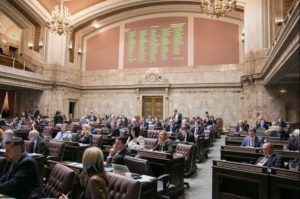2025-2027 Biennial Budget Summary
By League of Education Voters Policy Team
 In the 2025-2027 biennial budget compromise, all amounts are per biennium unless noted.
In the 2025-2027 biennial budget compromise, all amounts are per biennium unless noted.
Building a quality public education system from cradle to career.
By League of Education Voters Policy Team
 In the 2025-2027 biennial budget compromise, all amounts are per biennium unless noted.
In the 2025-2027 biennial budget compromise, all amounts are per biennium unless noted.
By League of Education Voters Policy Team
 The Governor’s budget was not included in this biennial budget proposal comparison due to limited budget details available, limiting our ability to provide a detailed comparison between budgets. This stemmed from the transition between administrations during the 2025 Legislative Session. You can read Governor Ferguson’s budget priorities here. Read More
The Governor’s budget was not included in this biennial budget proposal comparison due to limited budget details available, limiting our ability to provide a detailed comparison between budgets. This stemmed from the transition between administrations during the 2025 Legislative Session. You can read Governor Ferguson’s budget priorities here. Read More
By League of Education Voters Policy Team
 The 2024 supplemental budget makes adjustments to the 2023-25 biennial budget and impacts funding for the remainder of the biennium, which ends in June of 2025. The amounts below are in addition to funds that have already been appropriated in the 2023-25 budget. In the final budget agreement, all amounts are per biennium unless noted.
The 2024 supplemental budget makes adjustments to the 2023-25 biennial budget and impacts funding for the remainder of the biennium, which ends in June of 2025. The amounts below are in addition to funds that have already been appropriated in the 2023-25 budget. In the final budget agreement, all amounts are per biennium unless noted.
By League of Education Voters Policy Team
 The Washington state House and Senate have released their 2024 supplemental budget proposals. The 2024 supplemental budget makes adjustments to the 2023-25 biennial budget and impacts funding for the remainder of the biennium, which ends in June of 2025. The amounts below are in addition to funds that have already been appropriated in the 2023-25 budget. Read More
The Washington state House and Senate have released their 2024 supplemental budget proposals. The 2024 supplemental budget makes adjustments to the 2023-25 biennial budget and impacts funding for the remainder of the biennium, which ends in June of 2025. The amounts below are in addition to funds that have already been appropriated in the 2023-25 budget. Read More
By League of Education Voters Policy Team
 In the 2023-25 biennial budget compromise, all amounts are per biennium unless noted.
In the 2023-25 biennial budget compromise, all amounts are per biennium unless noted.
By the League of Education Voters Policy Team
The Washington state House and Senate have released their 2023-2025 biennial budget proposals. See how they compare with Governor Inslee’s budget proposal: Read More
By League of Education Voters Policy Team
 The 2022 supplemental budget makes adjustments to the 2021-23 biennial budget and impacts funding for the remainder of the biennium, which ends in June of 2023. The amounts below are in addition to funds that have already been appropriated in the 2021-23 budget. In the final budget agreement, all amounts are per biennium unless noted.
The 2022 supplemental budget makes adjustments to the 2021-23 biennial budget and impacts funding for the remainder of the biennium, which ends in June of 2023. The amounts below are in addition to funds that have already been appropriated in the 2021-23 budget. In the final budget agreement, all amounts are per biennium unless noted.
By Jacob Vela, League of Education Voters Director of Policy and Research

During the late hours of Thursday, March 10th, after a long day filled with passing floor resolutions and saying good-bye to colleagues that are choosing to not return, the Legislature took their final votes ending the 2022 Session. Despite the barriers and complications caused by the virtual session format, legislators were able to negotiate and successfully pass a substantial Supplemental Operating Budget, a Transportation Budget, and a Capital Budget. Logging more than 100 hours a week leading up to sine die, fiscal staff had to be the most relieved to watch the members take their final votes. Despite the overwhelming number of policy bills introduced early in the session, relatively few made it through the process, leading the House to begin referring to the Senate as the “graveyard” during floor speeches. Big thanks to all of you who participated in our Action Alerts this session. Read More
By League of Education Voters Policy Team
 The Washington state House and Senate have released their 2022 supplemental budget proposals. The 2022 supplemental budget makes adjustments to the 2021-23 biennial budget and impacts funding for the remainder of the biennium, which ends in June of 2023. The amounts below are in addition to funds that have already been appropriated in the 2021-23 budget. Read More
The Washington state House and Senate have released their 2022 supplemental budget proposals. The 2022 supplemental budget makes adjustments to the 2021-23 biennial budget and impacts funding for the remainder of the biennium, which ends in June of 2023. The amounts below are in addition to funds that have already been appropriated in the 2021-23 budget. Read More
By Jacob Vela, League of Education Voters Director of Policy and Research

It is hard to believe how much has happened during the past week in the Legislature. With less than three weeks left, everyone involved is digging deep to find that last burst of energy to help get across the finish line. Tuesday was the cutoff for House of Origin floor activity. Bills had to be voted out before 5:00pm, meaning that legislators and staff were putting in long hours to get the necessary work done. The House worked through the night on Monday, not adjourning until nearly 6:30am Tuesday morning only to turn right back around and start working again at 11:00am.
Wednesday morning bright and early, policy committees began holding public hearings on the bills that were passed from the opposite chamber. Hearing agendas were packed, and committee chairs usually would begin with providing friendly advice, or maybe a warning, to individuals who were scheduled to testify that “short testimony will be appreciated and often rewarded.” Within a two-hour block of time, a committee often has to hear 5-6 bills, caucus on an equal number of bills in executive session, and then also take a vote on the various amendments and bills. It is a whirlwind as members, staff, and advocates spend their days logging on and off various Zoom meetings trying to keep up with it all. The pace is unavoidable as the final policy committee cutoff is Thursday 2/24. Read More